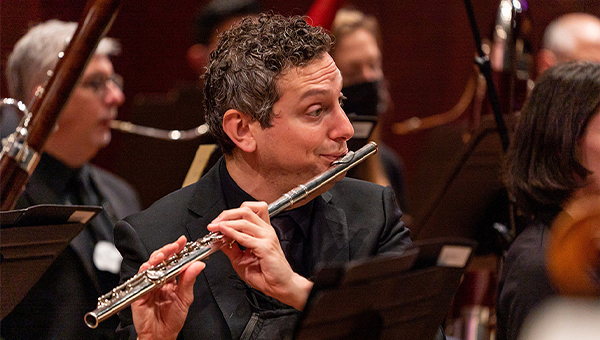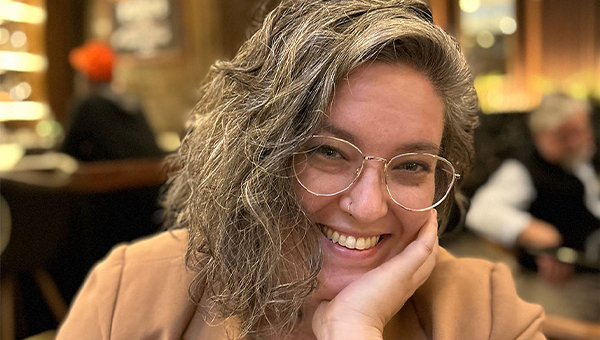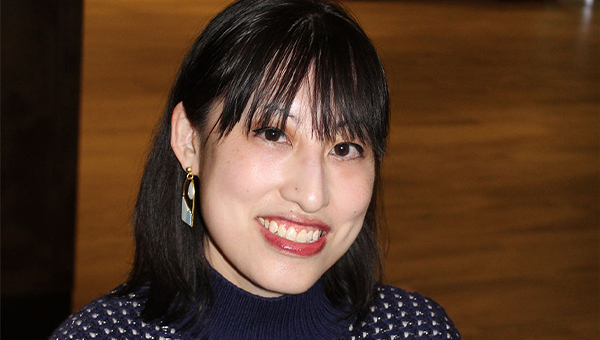From Pittsburgh to Seattle: Seattle Symphony Boasts Three CFA Alumni Among Its Ranks
By Pam Wigley
School of Music + Master of Arts Management Program
The Pacific Northwest attracts many people for its lush green foliage, bodies of water and exceptional outdoor activities. Seattle, in particular, is home to longtime native residents and transplants alike, all who are drawn to the location and its cultural offerings. The arts scene is thriving in Seattle, and three Carnegie Mellon University alumni proudly call the city and, specifically, the Seattle Symphony, home.
On the Stage: Jeffrey Barker
Growing up in Seattle, Jeffrey Barker always dreamed of joining the Seattle Symphony. His love of music developed early, and he began taking flute lessons in fourth grade. By ninth grade, he was under the tutelage of Zartouhi Dombourian-Eby. His hard work paid off; now associate principal flute in the Seattle Symphony, Barker and his former teacher are colleagues there.
“Seattle was always a goal,” he said. “I was delighted to win the position here, and it’s been nearly nine years already. When you do something you love, time goes quickly.”

Barker earned his undergraduate degree at the Eastman School of Music and his master’s degree from Carnegie Mellon School of Music —under the direction of Professor Emerita Jeanne Baxtresser and Associate Professor Alberto Almarza. He learned about Carnegie Mellon because of Baxtresser.
“She was a well-respected musician, as was Alberto,” Barker recalled. “I knew that there was world-class education happening at CMU. Now, not a day goes by without doing daily warmups that I learned there.”
His expertise landed him a role as principal flute with the Boise Philharmonic in 2009, until he made the move to Seattle. Barker has also performed with top orchestras across the country and around the world, including the Detroit Symphony, the Pittsburgh Symphony Orchestra, the Oregon Symphony and the Singapore Symphony.
In the meantime, Barker uses his spare time to give back to the Seattle community. He received the 2018 Ford Musician Award for Excellence in Community Service for his work with people experiencing homelessness in Seattle via the Seattle Symphony’s “Simple Gifts Initiative.”
“There are still pieces I want to do, perhaps as a soloist,” he said. “We’ll see what the future brings.”
Managing the People
Liz Kane combined two of her favorite things in her role at the Seattle Symphony: people and music. As the Personnel Manager of the Seattle Symphony, Kane used her expertise as a musician (French horn, which she studied in undergraduate school) and her administrative talents — honed by a series of roles in various arts organizations. Ultimately, Kane earned her master’s in arts management in 2018 through CMU’s Master of Arts Management program, a joint offering of Heinz College and the College of Fine Arts.
“I liked the MAM Program because it was a very data-driven education,” she said. “Although master’s degrees are not a prerequisite in orchestral management, I had some experience in my early jobs that left me wanting a deeper, business-focused education.”

She found it in Pittsburgh, which she said offered her the opportunity to see “an arts ecosystem that really supports large, world-class organizations in a city that’s shrunk quite a bit in the last century.” While serving as a student intern for the Pittsburgh Symphony Orchestra, Kane also witnessed a work stoppage, and the experience allowed her to see how the staff dealt with that challenging situation.
Just a month after earning her master’s degree, Kane was named assistant to the vice president and general manager at the Seattle Symphony. Following the COVID pandemic, she was promoted to her role in Seattle – just at the start of the 2021-2022 season. She found the job to be the perfect blend of her musical and operations strengths.
“I worked with both operations and musicians; Jeffrey and I actually worked very closely together as he is chair of the union,” she said. Her role focused on everything from musicians’ collective bargaining agreements, managing payroll, settling interpersonal issues, and overseeing audition and probation processes. On the operations side, she ensured the organization was adequately staffed, the schedule was set in a compliant way, programming was feasible, and assisted the general manager in negotiations.
Kane said she felt prepared coming into the organization in large part because of her education at CMU and within the MAM Program, specifically.
“CMU helped me to understand not only what I can contribute to the workplace, but also made me realize the value I bring,” she said. “Professor Brett Crawford, my advisor, was an incredible help in showing me what I’m capable of and how I can contribute to arts organizations.”
In offering advice to current students or recent alumni, Kane pointed to her own guidelines for success.
I recommend aiming to be a humble sponge, absorbing all the good and bad information you can, but doing it with humility and understanding that there are many ways to do things … don’t rush the answers to difficult questions. There’s almost always more time than you think to think creatively and find options that weren’t immediately apparent.Liz Kane (MAM '18)
Editor’s Note: Liz Kane recently was promoted to a new role as director of artistic operations for the Portland Symphony in Maine. There, she will oversee the personnel manager, librarian, and technical manager. She also will serve as operations lead and, as such, will contract with musicians individually, serve as one of the lead negotiators in contract negotiations, and set budgets for the season. Because the Portland role is with a smaller orchestra, Kane’s duties allow her to expand her experience. She will serve as the administrative lead on programming — she said the music director sets the classical programs — but she aligns those choices with strategic plans, equity goals, and budgetary goals, and will lead all the pops booking.
“This was my dream job when I was at CMU,” Kane said. “It involves operations and artistic planning, and I am happiest working in both departments. Portland is also the first orchestra I ever worked for, and I know the staff there well. It’s also about two hours from where I grew up and where my parents and sisters are located.”
Welcoming the Public
Even as great talent takes the stage at Seattle Symphony and is, in itself, a draw, it still takes a team in the background to get audience members in seats. Enter Michelle Cheng, marketing manager for subscription sales at the symphony.
Cheng, a 2013 graduate of the MAM Program, is charged with encouraging the Seattle and surrounding communities to enjoy the symphony’s calendar of events through subscription sales. She, like fellow MAM alumna Liz Kane, has blended her educational interests into a career that helps her to introduce others to the arts.

Growing up as an only child in Rockland County, N.Y., Cheng pursued her study of the violin from fourth grade through her undergraduate years at Case Western Reserve University. She graduated with a degree in music history and decided to pursue her master’s degree at Carnegie Mellon. She was drawn to the MAM Program because she found during her research that there were a limited number of programs that allowed students to actively participate in studies that had a social impact, as well as vital skills necessary to move into the arena of arts management.
“I wanted a program that provided a solid tech experience, which I found at CMU, and that’s helped me tremendously,” she said. “I appreciated the rigor of the program and valued the lessons I learned from Kathy Smith regarding finance and Brett Crawford in digital marketing. To this day, I use those skills.”
Cheng remembers her time in Pittsburgh fondly, and she named “Future Tenant” and the Cultural District’s Gallery Crawl as two of her favorite experiences while at CMU. Future Tenant is a program that gives artists and performers the opportunity to exhibit their work since its founding in 2002. MAM students gain hands-on arts management experience that builds their skills and prepares them for the workforce.
Cheng recommends that current students take advantage of life off campus, including the rich arts scene in Pittsburgh.
You should experience as much as you can. Keep an open mind as you pursue your education and think about things outside of your training. You have skills that may be transferrable to what you hope to do some day.Michelle Cheng (MAM '13)
In approaching her job on a daily basis, Cheng said she makes it her personal mission to make sure her efforts positively affect people who become subscribers. Cheng said she makes it her personal mission to make sure her efforts positively affect people — from couples on a date to children and families who are attending the symphony for the very first time — and result in a truly memorable experience at Seattle Symphony."
“I focus on flexibility, because everyone has different needs,” she said. “We help people create a plan that works for them, and it’s rewarding to see how it all comes together when the house fills with enthusiastic guests.”
Photography courtesy of Seattle Symphony Orchestra